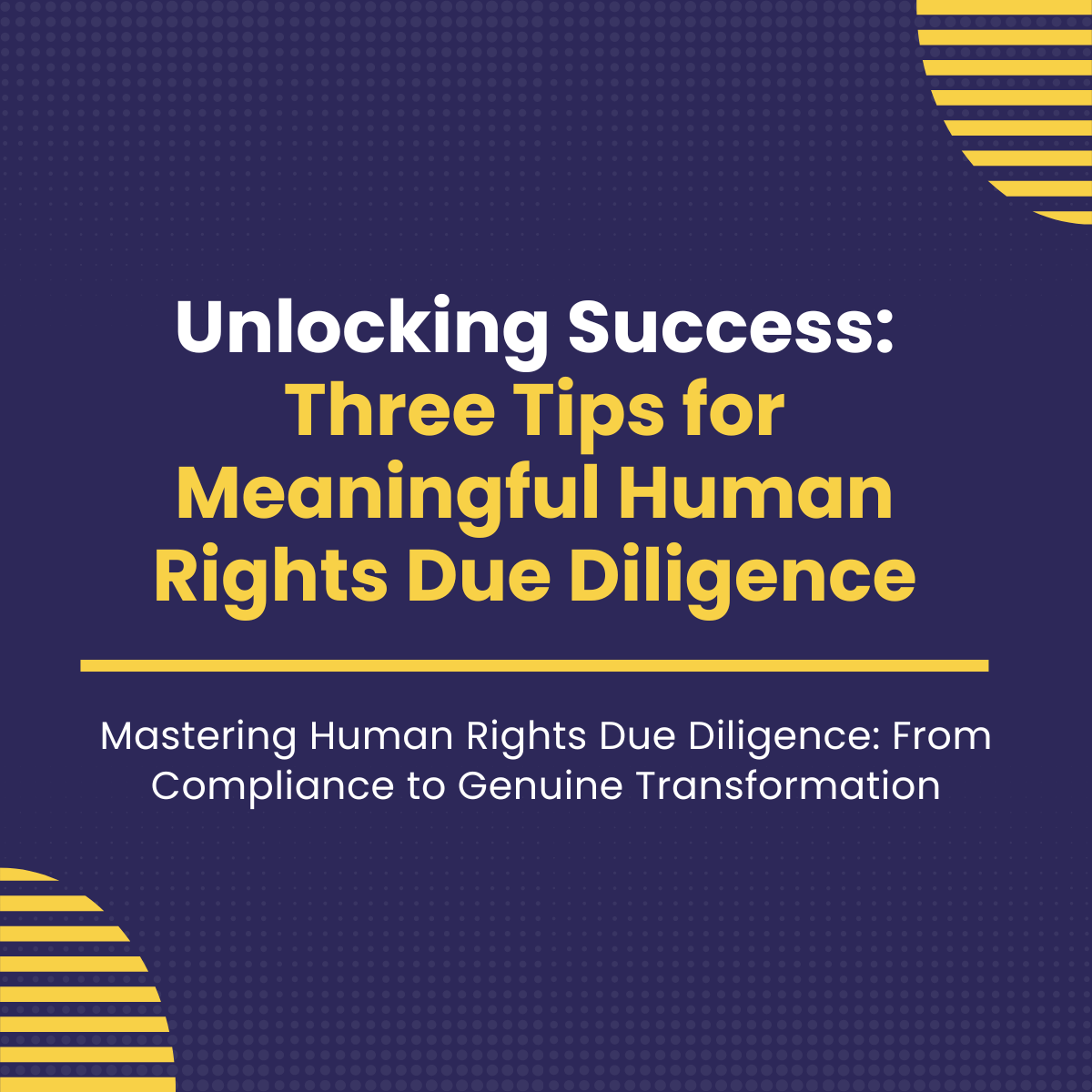At the 2025 OECD Forum on Due Diligence in the Garment and Footwear Sector, industry leaders, policymakers, and experts came together to discuss the evolving landscape of responsible business conduct. From strengthening human rights due diligence to addressing purchasing practices and supply chain visibility, the conversations underscored the urgent need for action and collaboration. This blog highlights key takeaways from the discussions that will shape the future of due diligence in the sector.
Read MoreIn our previous blog, we explored the critical choice businesses face between the compliance route and meaningful transformation in human rights due diligence (HRDD). Now, it's time to move from theory to practice. This second instalment provides three essential tips to help you embark on that transformative journey. Learn how to ensure compliance while fostering sustainable growth, enhancing stakeholder relationships, and transforming your supply chain into a resilient and positive force. Dive into actionable strategies that can elevate your HRDD efforts from a mere regulatory exercise to a value-generating initiative.
Read MoreIn today's complex regulatory environment, businesses face increasing pressure to ensure responsible practices throughout their supply chains. This two-part blog series explores practical strategies for effective Human Rights Due Diligence (HRDD). In Part 1, we examine the regulatory changes and the choices businesses face between taking a compliance-driven route or opting for meaningful transformation. Discover how to navigate the crossroads between mere compliance and fostering genuine improvement for people and the environment while allowing businesses to thrive.
Read MoreAs &Wider grows, we’re focusing on social sustainability and new legal frameworks like the EU Corporate Sustainability Due Diligence Directive. We partner with those committed to improving workers' lives through collaboration and data-driven insights. Our clients tackle labour exploitation in supply chains proactively, using worker-sourced data to drive continuous improvement.
Read MoreEngaging suppliers in human rights due diligence can be challenging, especially when they are already managing various compliance requirements. Here's how we, as the &Wider’s implementation team effectively onboard suppliers to take our worker monitoring surveys, to make the process mutually beneficial.
Read MoreThe EU Corporate Sustainability Due Diligence Directive has hit a roadblock, but that doesn't mean we hit the brakes on getting ready for human rights due diligence.
Read MoreWe have not gotten the recruitment and treatment of migrant workers in global supply chains right yet. This means that there is also a cultural consensus that there are no heroes , so no one should claim successes.
Read MoreSuppliers play a crucial role in driving change and shaping the working lives of workers. However, getting suppliers to willingly sign up to allow worker engagement systems to be introduced can be quite challenging. In this blog post, we will explore strategies to unlock supplier buy-in and interest in the benefits of worker engagement.
Read MoreI like to describe the human rights due diligence process as a funnel, where an individual brand begins with its entire supply base and uses reliable data and insight to assess which parts of its supply chain warrant deeper due diligence.
Read MoreGiving attention to the intent of listening to workers helps ensure that the organisation will take thoughtful action with this feedback.
Read MoreWe conduct Direct Worker Reporting for our clients. What then is the difference between Direct Worker Reporting and Worker Voice Technologies?
Read MoreThe net is closing on companies who don’t pay attention to human rights due diligence in their supply chains. What does this means for companies operating in Europe?
Read MoreWhere does Direct Worker Voice fit into your responsible sourcing strategy? We run through three major ways you can incorporate Direct Worker Reporting to your responsible sourcing programme for maximum impact and value.
Read MoreDisclosure requirements around the world are increasingly becoming the new norm, but they are rife with references to risk: how do you overcome this and move beyond risk mitigation toward impact?
Read MoreNobody really knows the deeper implications for the world's most vulnerable workers. But isn’t it worth opening up channels for listening to them and doing so sooner rather than later?
Read MoreThe spotlight and pressure these named and shamed brands faced has the effect of accelerating progress, and unlocking internal buy-in. But the public only got the first part of the story - the scandal.
Read MoreThank the gods (and the UN) that we didn’t apply the worker wellbeing argument to human rights.
Read MoreIt was refreshing to observe a change in tone and seriousness during the annual SEDEX conference.
Read MoreSome workers may never risk giving candid feedback about their working conditions. But even in precarious workplaces, we do and will continue to find workers who will still risk it.
Read MoreWhat if you were sitting around a dinner table and a friend said: “None of us should buy anything made in China because there is modern slavery in China”. What would you say?
Read More



















